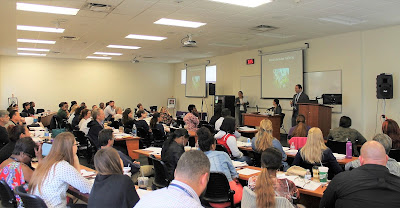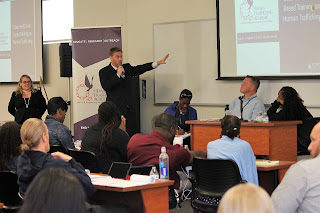 |
Barbara
Martinez, Chief of the Special Prosecutions Section, U.S. DOJ, Miami U.S.
Attorney's Office, Benjamin Widlanski, Assistant United States Attorney, and HSI-ICE
Special Agent Claudia Velez discussing the Federal Prosecution of Human Trafficking
Cases
|
St. Thomas Law hosted its one-week Human Trafficking Academy for the second time this year, on July 31 – August 4, 2017. The Academy, under the leadership of its director, Dr. Roza Pati, Professor of Law and Executive Director of the LL.M./J.S.D. Program in Intercultural Human Rights, brought together 62 participants from all over Florida, the United States and also from Thailand. They represented a multi-disciplinary group of various professional backgrounds including attorneys, law enforcement and border protection, social service providers, child protective investigators, academics, advocates, students and faith-based organizations.
 |
Bretton
Engle, Ph.D., Assistant Clinical Professor at FIU College of Medicine, interacts
with Academy participants who role-play motivational interviewing
|
This summer’s Academy offered five days of intensive education on: Defining, Understanding & Identifying Human Trafficking; Victims’ Needs & Navigation through Services; Federal Prosecution of Human Trafficking; Addressing Human Trafficking through State Law; Social Responsibility & Community Involvement; Survivor-Centered Services & Advocacy; Technology & Human Trafficking; and the Media & Human Trafficking. The week-long training was designed to empower participants with the theoretical perspective and legal framework of human trafficking as well as with practical skills and tools that are essential in addressing and preventing this heinous crime. Each session was taught by a distinguished team of instructors including: Greg Bristol, former FBI Special Agent; Joseph Martinez, former NCIS Special Agent; Barbara Martinez, Chief, Special Prosecutions Section, U.S. DOJ, Miami U.S. Attorney's Office; Benjamin Widlanski, Assistant United States Attorney, U.S. DOJ, Miami U.S. Attorney's Office; Ana Isabel Vallejo & Maria Jose Fletcher, Co-Directors & Attorneys, VIDA Legal Assistance; Brenda Mezick, Chief, Human Trafficking Unit, Miami-Dade State Attorney’s Office; Sean Sellers, Director of Strategic Partnerships, National Economic & Social Rights Initiative; Bretton Engle, Assistant Clinical Professor, FIU College of Medicine; Janet Basilan, Survivor & Vice-Chairperson, GABRIELA USA; Roy Balleste, Professor of Law, St. Thomas University School of Law; and Beatriz Susan Uitts, J.S.D. Candidate, St. Thomas University School of Law.
 |
Professor Roza Pati, Director of the Human Trafficking Academy,
and Janet Basilan, survivor of human trafficking and Vice Chairperson
of GABRIELA USA
|
In welcoming participants at the opening session, Dr. Pati promised that the Human Trafficking Academy would be an extraordinary educational and training experience and that participants would leave empowered with the necessary knowledge and skills to combat the abhorrent scourge against human dignity.
The Academy featured guest speaker, Janet Basilan, a survivor of human trafficking and Vice Chairperson of GABRIELA USA, a Philippine-based organization in the United States seeking justice for trafficked persons. Ms. Basilan was one of the many Philippine teachers who were lured to the U.S., with false promises of well-paid teaching positions. Later she learned that everything was a scam. She was a victim of deception, debt-bondage and coercion. Her story was eye opening to many of the attendees who “never thought things like this happen in the U.S.” Ms. Basilan is a survivor-advocate determined to combat human trafficking in her home country and here in the United States.
Throughout the week, the participants were greeted and warmly welcomed by the most senior university officials, Monsignor Casale, President of St. Thomas University, Dr. Irma Becerra, Provost and Chief Academic Officer, and Professor Alfredo Garcia, Dean of the Law School. They all appreciated the contribution rendered by participants against human trafficking and their dedication to supporting victims in every institution and organization they hail from.
 |
Msgr. Franklyn Casale, President of St. Thomas University,
Dr. Irma Becerra, Provost and Chief Academic Officer,
and Professor Alfredo Garcia, Dean of the Law School—welcoming
and greeting participants
|
The Academy concluded with a special screening of “Trapped,” a short documentary film produced by Emmy Award-winning investigative journalist, Michele Gillen.
Participant feedback was overwhelmingly positive and met Dr. Pati’s promise to them:
“This most recent academy was my second to attend and found both to be rewarding, challenging, and enriching. I was rewarded with knowledge through experience, challenged with theory and practical application, and enriched with an enhanced ability to better impact positively the horrific crime and human condition of human trafficking. In addition to the instructional environment, the physical space was well appointed for learning. Thank you, Dr. Pati, for the effort and the hard work of your staff.”
Cpl. Alan Wilkett,
Pasco Sheriff's Office
---
“The multi-disciplinary approach of the Human Trafficking Academy was excellent. The content of the presentations and materials were extremely informative, easy to comprehend and well organized. The professional and dedicated cadre of instructors represented academia, civilian attorneys, state and federal prosecutors, NGOs, media, volunteers and survivors. The real examples, scenarios and role play exercises definitely allowed for the students of the academy to apply knowledge learned during lectures. Finally, Dr. Pati, Karla and volunteers made everyone feel at home and comfortable during the training week.”
Benjamin Botero, Assistant Professor,
Criminal Justice, Broward College
---
“Very informative, value-based, practical, to [the] point, resourceful in real time, impressive instructor selection, well put together by staff, [and] well needed.”
---
“This is an invaluable place to learn as well as collaborate…Wonderful course and relevant to all levels of experience and understanding of subject matter. Thank you! Well done!”
---
“The materials presented were diverse including information germane to investigations by law enforcement, NGO’s, health care, and community based groups.”
---
“The training was well organized, well timed and I learned a lot. Definitely will be useful in my field of work. Thank you Prof. Pati for your hard work.”
---
“Excellent logistic! Very good room environment—well organized!!”
---
“Thank you for your commitment and passion. Good luck and God bless all of you.”
St. Thomas Law's bi-annual
Human Trafficking Academy is designed to conduct research, outreach and education in the field of human trafficking. In particular, it offers specialized training and technical assistance to law enforcement, lawyers, healthcare providers, teachers, students, researchers, religious institutions and the community at large on issues related to the crime of trafficking in persons. It looks at trafficking in persons as a gross violation of human rights and as an affront to the dignity of the human being.






